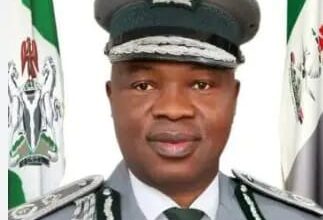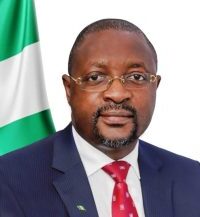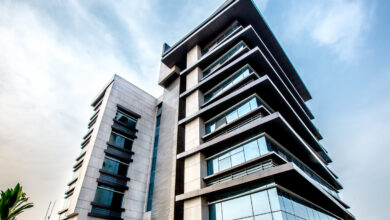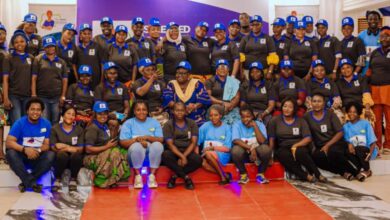Tinubu……Dawn of a new era

Tinubu and Shettima
By The Nation Newspaper
Since the Third Republic when he rose to prominence as a senator, Asiwaju Bola Tinubu has been on the firing line. Deputy Editor EMMANUEL OLADESU delves into the battles, struggles and exploits of the pro-democracy crusader, former governor of Lagos State and National Leader of the ruling All Progressives Congress (APC), who was inaugurated yesterday as the 16th President and Commander-in-Chief of the Nigerian Armed Forces.
The road has been rough and laced with thorns. The journey has been long and tortious. But yesterday, Bola Ahmed Tinubu, Asiwaju of Lagos and former governor of the Centre of Excellence, led Nigerians into a new dawn as President and Commander-in-Chief of the Armed Forces.
He had endured the stress of electioneering, including the unwarranted assaults by social media hoodlums. He scaled through the primary hurdle, with eight other All Progressives Congress (APC) presidential aspirants stepping down for him at Eagle Square, Abuja, where he is receiving the baton from President Muhammadu Buhari.
Tinubu also ran into political turbulence when he opted for the same faith ticket. He was realistic. He never made a mistake. He understands Nigeria. He survived the vituperation.
The campaign was tedious, time-consuming, and energy-sapping. Armed with the best blueprint, “Hope Rekindled,” he traversed the length and breadth of Nigeria, explaining to voters why he was the best candidate. His manifestos on education, health and social welfare, economic revitalisation, power, transportation, industrialisation, job creation, oil and gas, and foreign relations revealed a depth of superlative knowledge of the challenges. He offered the best campaign promise.
Other obstacles thrown on his path included the failed naira swap and inexplicable fuel scarcity which pitched many against him and his party.
Tinubu was mocked by unserious rivals who depended on social media commentaries to gauge public opinion.. The campaign was rigorous. It was during the campaigns that the rumours and lies about ill health collapsed, like a pack of cards. Nigerians saw a president-in-waiting, full of zest, agility and balance.
On poll day, he dazed his opponents who relied on tribal and religious sentiments. The APC candidate was confident. He was bubbling with a national outlook. When rivals appealed to ethnic and religious jingoism, he appealed to the generality of Nigerians, irrespective of tribe, religion and political leaning.
Tinubu won in five of the six regions in a free, fair, transparent and credible election.
But, the battle was not over. His foes went to court by proxy to stop him, raising eligibility questions. The plaintiffs crashed at the temple of justice, to the consternation of their sponsors. He won all the cases.
Today’s historic inauguration attests to the fulfillment of a long-time ambition to serve the country in the highest office. It is a fulfillment of destiny for the acclaimed ‘City Boy,’ who has been making an impression on discerning Nigerians as the man of the future for three decades.
Tinubu had faced the challenge with uncanny courage, being motivated by the realisation that power is not served a la carte. He worked hard, building structures and cross-regional bridges of understanding. He was an opposition leader when the battle was hot, and he never wavered. He was focused on goals, resolute in pursuit of principles and came across as a defender of the people who yearned for a lease of life under a progressive administration.
His battles, struggles and triumphs aptly underscore the indisputable fact that, at any critical time in the life of a community, nation, and nation-state, circumstances have always thrown up outstanding leaders endowed with mega capabilities to spearhead legitimate agitations and canvass the unexplored alternative route to solutions to the fundamental questions.
Tinubu is a great soldier of democracy whose great attribute is the resolve, resilience and determination with which he has always fought popular battles on behalf of the masses.
Since 2003, when he became the last man standing in the Southwest, Tinubu has been perceived by many as an oak tree offering shades to a vast progressive followership. He had become the most colourful Yoruba politician in the post-Bola Ige era. Many believed that he was not only an asset to the Southwest, his geo-political zone of birth, but also a national property now raising the core issues germane to the progress, prosperity, peaceful co-existence and survival of the nation-state.
It is gratifying that the opportunity that eluded earlier leaders, including the late Chief Obafemi Awolowo, the late Chief Moshood Abiola and the late Chief Bola Ige, landed on Tinubu’s palm.
When the poll-confident Southwest was submerged by the Peoples Democratic party (PDP) rigging machine in 2003, only Lagos State, where Tinubu was governor, survived the onslaught.
Since then, the restoration of the Southwest’s lost glory became his preoccupation. Tinubu worked tirelessly for the return of the stolen mandate in the five states. PDP hawks, having penetrated the AD, crippled the platform. The old party in ruins, Tinubu, a man of foresight, working in concert with like minds, spearheaded the establishment of another masses-oriented party, the Action Congress (AC), which later metamorphosed into the Action Congress of Nigeria (ACN). The party then reclaimed Ekiti and Osun states from the PDP interlopers. Not only did ACN consolidate its hold on Lagos, Osun and Ekiti, it also reclaimed Ogun and Oyo states, thereby fulfilling the dream and vision of the illustrious pathfinders-Awo, Adekunle Ajasin, Abraham Adesanya and Ige-that only a rational government bubbling with progressive tendencies should steer the affairs of the Southwest. The monumental achievement was a worthy tribute to Tinubu and other credible, strong-willed, and principled progressive leaders in the region who stood firm during the dark period between 2003 and 2011.
As Tinubu stands before the mirror of history, what is discernable from the mirror? He is, first and foremost, a professional; an accountant and financial surgeon, who had paid his dues in the competitive private sector; a shrewd businessman and core investor, manager of men and resources; a benevolent capitalist.
But he is also a consummate activist, prolific analyst, strategic thinker, humanist, philanthropist, astute administrator, visionary leader, a man of foresight, a courageous fighter, a people’s politician, statesman, and citizen of the world.
For Tinubu, politics is a vocation and the scramble for power is only meaningful if power is employed to bring succour to the generality of the people. If his sojourn in the corridor of power laid the premise for his political fame, his antecedent as a private sector operator actually prepared him for his future endeavour.
His professional colleagues and co-employees at Mobil Nigeria recalled the picture of a workaholic treasurer, who never compromised organisational goals of efficiency, productivity and office ethics.
He was persuaded to leave his lucrative career around 1989 to participate in politics as a “new breed politician”. He could not have been indifferent to politicking, having been brought up by the prominent women leader and Awolowo devotee, the late Alhaja Abibat Mogaji, Iyaloja-General of Lagos, who played prominent roles in the Action Group (AG) and Unity Party of Nigeria (UPN) Women Caucus, which revolved around the wife of the late sage, Yeyeoba Hannah Idowu Dideolu Awolowo.
In the Third Republic, Tinubu took the politics of Lagos West Senatorial District by storm. The leaders and people of the district who endorsed his ambition for the Senate in 1990 testified to his political prowess, mobilisation acumen, organisational ability, power of foresight and masterful logic.
During the screening of candidates, Tinubu scored the highest mark. He answered highly technical questions with immensurable wit. Old politicians on the panel, who had written off the new breed, changed their minds. They contended that the Lagos West senatorial candidate of the Social Democratic Party (SDP) would definitely shake Lagos in the future. On the day he was screened, Tinubu became a leader to watch.
During the election, Tinubu scored the highest number of votes in the West District, the largest in the country, beating his rival, the late Mrs. Kemi Nelson of the National Republican Convention (NRC). He scored votes that many governors could not garner in their states at that time.
His compatriots in the turbulent Senate of Dr Iyorcha Ayu and Ameh Ebute described him as a high flyer, tactician, and thorn in the flesh of General Ibrahim Babangida Administration. As the military regime wobbled on in deceit and decay, Tinubu was among federal lawmakers who challenged the junta to a duel. He was among the brave ones who dared the military gun by insisting on a terminal date, which the military set for itself. When colleagues were bought over with money, Tinubu was on the firing line; consistent and adamant. Ironically, the fall of the regime led to a chain of events, which consequently aborted his career in the Senate.
In the Senate, he was not a bench warmer. He was a firebrand senator and vocal advocate of an end to ‘militocracy.’ As the Chairman of the Appropriation Committee, he was irked by the kangaroo budget presented by the Chairman of the Transitional Council, Chief Ernest Shonekan, saying that it was not premised on need analysis. Sensing that the document could herald economic jeopardy, the committee sent it back to the executive for rework.
On the floor of the Senate, Tinubu asked the soldiers of fortune to pack their load, warning that further delay could lead to a popular uprising. When the 1993 presidential election won by Abiola was criminally annulled, he opposed the military rascality. He was among the SDP senators who stood behind Abiola till the end. He rejected the military carrot, which he knew would be accompanied by a cane. Tinubu was marked for liquidation. He had started suffering some bruises before he managed to escape abroad. From the United States, he fired salvos at the late Abacha, financed Radio Kudirat and inspired other freedom fighters to sustain the tempo of anti-military struggle at home.
The pro-democracy elements who co-ordinated the titanic battle against the military, following the annulment of the historic June 12, 1993 presidential election won by Abiola, have attested to Tinubu’s inspiring, brave and bold leadership as a dogged and principled fighter for justice.
Members of the National Democratic Coalition (NADECO), of which he was an arrowhead abroad, have continued to speak glowingly about his dedication, courage of conviction, fighting spirit and financial backing for a noble cause.
Tinubu, who returned from exile, bounced back in 1999. As governor of the Lagos for eight years, he showed that he was an experienced and excellent administrator, who, through his achievements, laid the foundation for a prosperous Lagos. He instantly became a role model and the pride of the Western Region. Others would salute his large heart as a cheerful giver, benefactor and godfather to many young politicians he had nurtured for public offices. But more than that, Tinubu became a national property and detribalised apostle of national unity. He has come across as a bridge builder and strong believer in the prospect of one Nigeria premised on equity, fairness and justice.
It is debatable that the pro-democracy agitations sacked the military rule. Many have argued that there was a hand of God in it all, for while pro-democracy forces waged the war, Abacha still loomed large on the country, until his sudden death.
When Tinubu returned home, the NADECO/Afenifere leaders of Ogun State origin insisted that he should serve as governor. To them, it was suicidal to allow a military stooge to rule Lagos, despite the fact that he had the full support of their colleague, the late Alhaji Ganiyu Dawodu. In 1999, he defeated Dapo Sarumi, the PDP candidate. it was ironic, because in 1991, he had backed Sarumi, the leader of ‘Primose’ for the job against the late Prof. femi Agbalajobi, who had the backing of former Governor Lateef Jakande. Both camps paid for the cracks on the wall, which allowed the NRC candidate, the late Chief Michael Otedola, to get to power.
In 2003, Tinubu was re-elected, based on his performance and inspite of the hostility of Afenifere leaders, on whose back he had ridden to power four years earlier, as it were. His colleagues in Oyo, Osun, Ondo, Ekiti and Ogun states-Alhaji Lam Adesina, Chief Bisi Akande, Otunba Niyi Adebayo, and Aremo Segun Osoba-were not lucky. Their governorship careers were consumed by the political earthquake that swept across the region. Up came the reactionary elements who were clearly estranged from the legitimate aspirations of the Southwest.
The ‘Tinubu Years’ have remained a reference point in Lagos. The third civilian governor of Lagos embraced the duties of governance with passion. Like Awo, his model, he set up an executive council of talents. He did not condone indolence and he made accountability his watch-word. Free education, free health services, gainful employment, rural development, housing and infrastructural development were pursued with vigour. The administration built more classrooms, rehabilitated the existing ones, expanded health facilities tarred roads and promoted security. He also introduced the BRT to ease intra-city transportation in the metropolis. Under the administration, Lagos became an attractive place for investment because of the conducive atmosphere.
Tinubu had initiated the Independent Power Project (IPP), which would have creatively resolved the epileptic power supply in the state. But the effort was thwarted by the federal government.
Tinubu had charged Lagosians to take their destiny in their hands. In response to their yearnings for grassroots development, 37 local council development areas were created, following the conduct of a referendum. But, Former President Olusegun Obasanjo wielded the big hammer, seizing the allocations to the councils. For more than three years, the councils were nearly grounded to a halt, but the internally generated revenue, which was on the increase, became the saving grace. Through Tinubu’s financial engineering, the local governments survived.
From that stage, Tinubu embraced a new pastime; the battle for true federalism. He intensified his advocacy for fiscal federalism, devolution of powers, state police and general restructuring of the polity. To him, a true and credible sovereign national conference was inevitable, although it was being delayed.
In 2007, Tinubu handed over the reins to a competent lieutenant, Mr Babatunde Fashola (SAN), who had built on the foundation he laid. Tinubu had wanted to return to the Senate, but he decided otherwise.The coast was not clear. He advised Ganiyu Solomon to pick the form.
Outside power, he became the fierce leader of opposition. He also turned his attention to the battle for free and fair elections. No politician of note in the country has fought the battle for electoral reforms more than Tinubu, who has stood behind the Coalition of Democrats for Electoral Reforms (CODER) like the rock.
Under his leadership, ACN enlarged its coast to other six geo-political zones, thereby becoming a national party and credible alternative. After regaining its prized stronghold in the Southwest, the party waxed stronger, winning elective seats in the Northcentral, Southeast and Southsouth zones. Apparently to silence him, Tinubu was arraigned for trial at the Code of Conduct Tribunal for keeping foreign accounts. To the chagrin of his foes, the tribunal toed the path of the rule of law, declining jurisdiction. On the way to the tribunal at Abuja, the popularity of Tinubu dwarfed them. His supporters were denied entry into the Federal Capital Territory (FCT).
As from 2014, ACN opened talks with like-minded parties-Congress for Progressive Change, (CPC), All Nigerian Peoples Party (ANPP), a faction of All Progressives Grand Alliance (APGA) and new Peoples Democratic Party (nPDP). The legacy parties agreed to return their certificates of registration to the Independent National Electoral Commission (INEC) in a bid to form the APC. The party, under the leadership of Tinubu, fielded Buhari as presidential candidate. He won in 2015 and 2019 polls.
A man of history, Tinubu’s rise to fame is an act of God. He was not born into greatness; neither was greatness thrust upon him on a platter of gold. He achieved greatness through hard work, resolve, and determination. So far, he has demonstrated a huge capacity for the management of the achievements.
Born on March 29, 1952, Tinubu endured, like many others, a difficult childhood and today, he has a tale of survival to tell. His academic sojourn in the United States started in 1975 at Richard Daley College, Chicago, Illinois, where he justified himself before proceeding to Chicago State University, graduating in 1979 with a first class honours in Business Administration, specialising in Accounting and Management. In his last year, he taught the remedial tutorial classes on part-time basis. Throughout his studies, he was on the Dean’s List.
A campus politician, Tinubu was also the President of the Accounting Society in his final year. In the course of professional practice, he has traversed blue chip companies-Arthur Anderson, Deloitte Haskins, GTE Service Corporation, and Mobil Nigeria-where he was treasurer. He was a contributor to worthy social and community causes as an acclaimed philanthropist before becoming a politician of repute.
He holds the honorary chieftaincy titles of Jagaba of Borgu Kingdom, Aare of Ile-Oluji and Are-Ago of Egbaland. Today, he is president of all Nigeria.
Many Nigerians believe that President Tinubu will make a difference and that the country will not remain the same.
Paying tribute to him, Ondo State Governor Rotimi Akeredolu said Nigerians look forward to what Nigeria will become under his leadership.
To Senator Opeyemi Bamidele (Ekiti Central), Tinubu is the answer to Nigeria’s problems.
He said: “Tinubu’s swearing-in today is the fulfilment of destiny and wish of the Creator, who has acceded to the collective prayer of Nigerians for the enthronement of a democrat, visionary and statesman, who is fully prepared to offer diligent service and make a difference.
“It is noteworthy that after serving as Senator, pro-democracy crusader, two-term governor of Lagos State, courageous opposition arrowhead, and National Leader of the ruling All Progressives Congress (APC), your bid for the highest office in the land was premised on your patriotism, loyalty to country and commitment to public good.”
He added: “Indeed, your belief in the capacity of our beloved country to transform into an economically buoyant and politically stable giant of Africa under a rational, democratic and just leadership is legendary.
In this period of greater expectations, Nigerians look up to you as a solution centre in their quest for answers to the myriad of socio-economic and political challenges confronting the federal nation-state.
I believe that under your watch, our country will overcome its perennial crises, recover lost grounds and occuply its befitting place in the comity of nations.”





